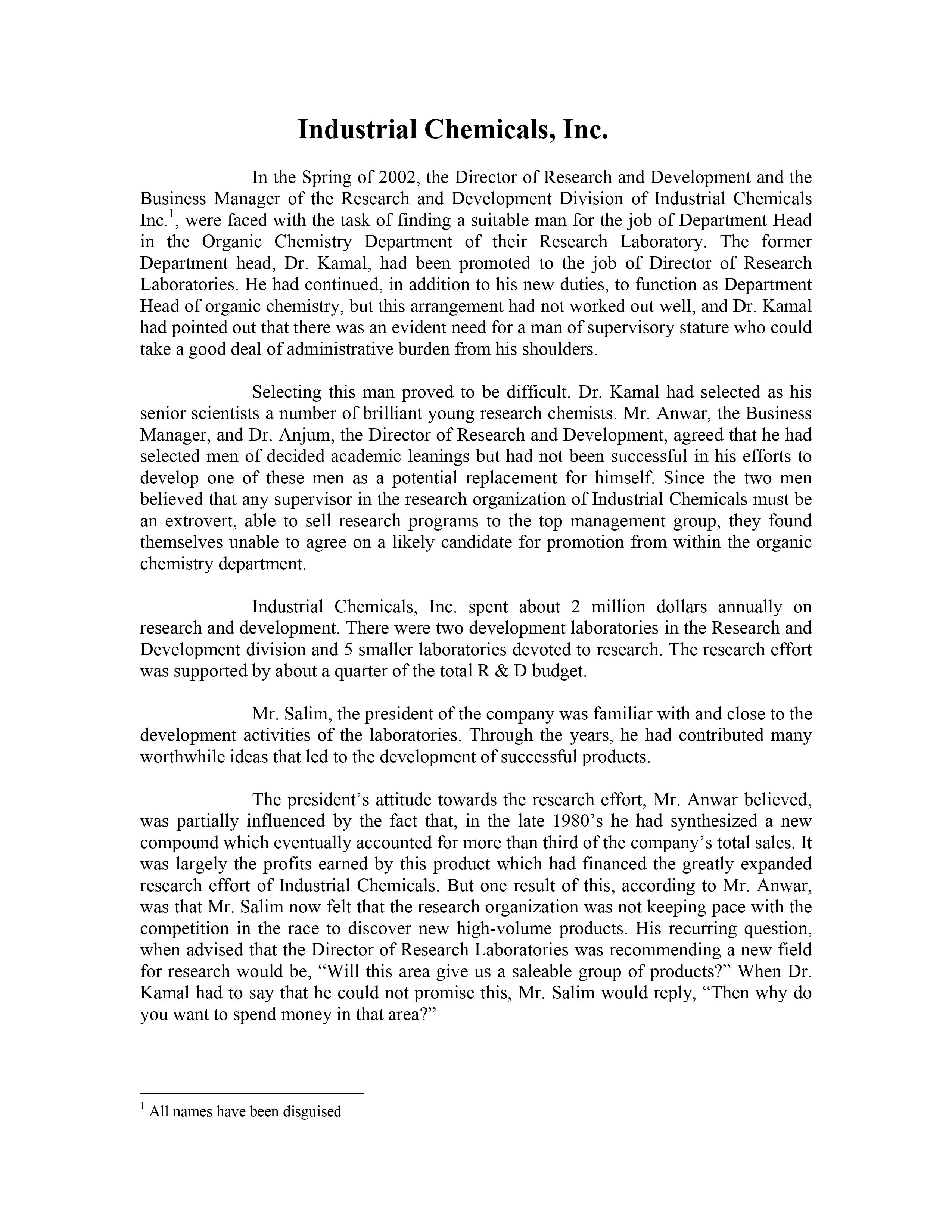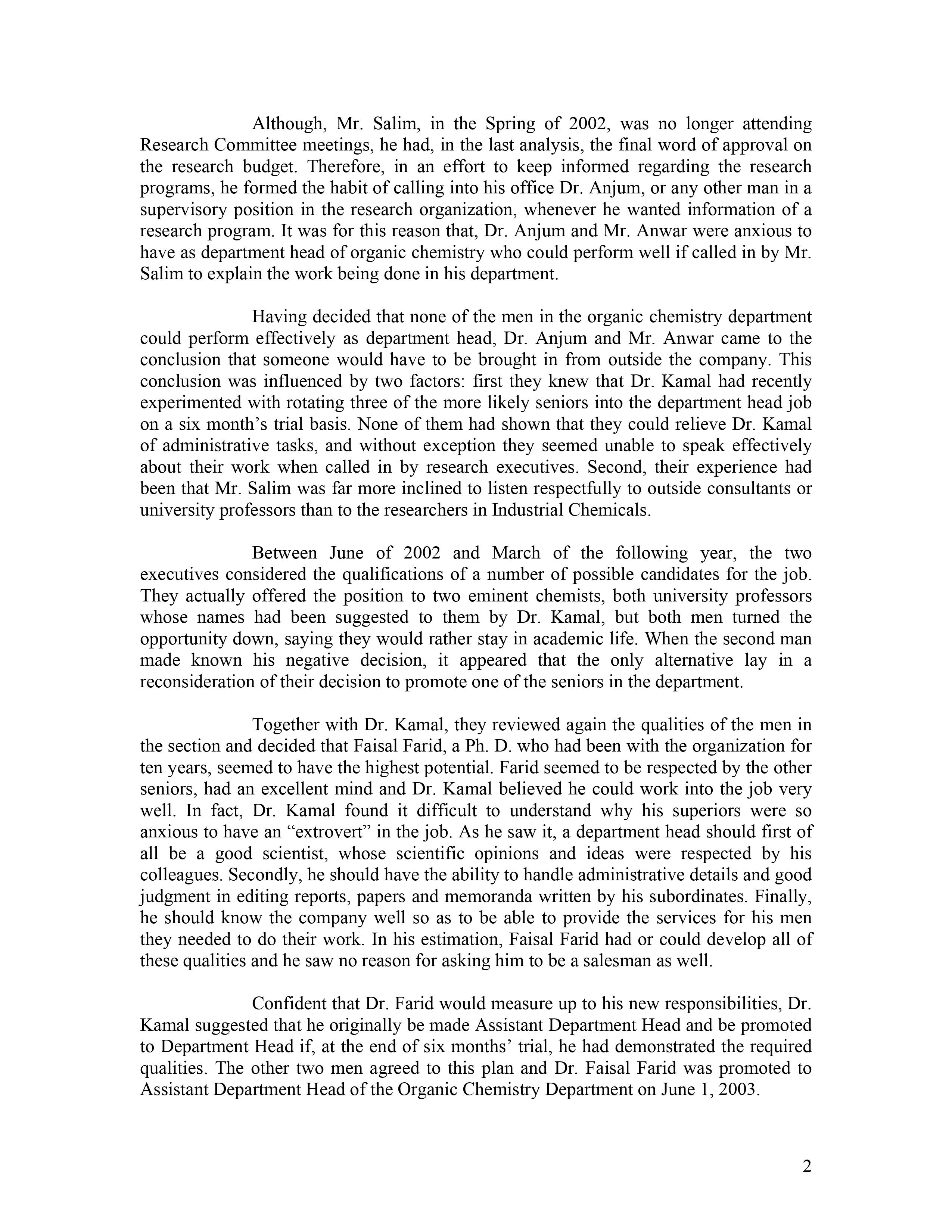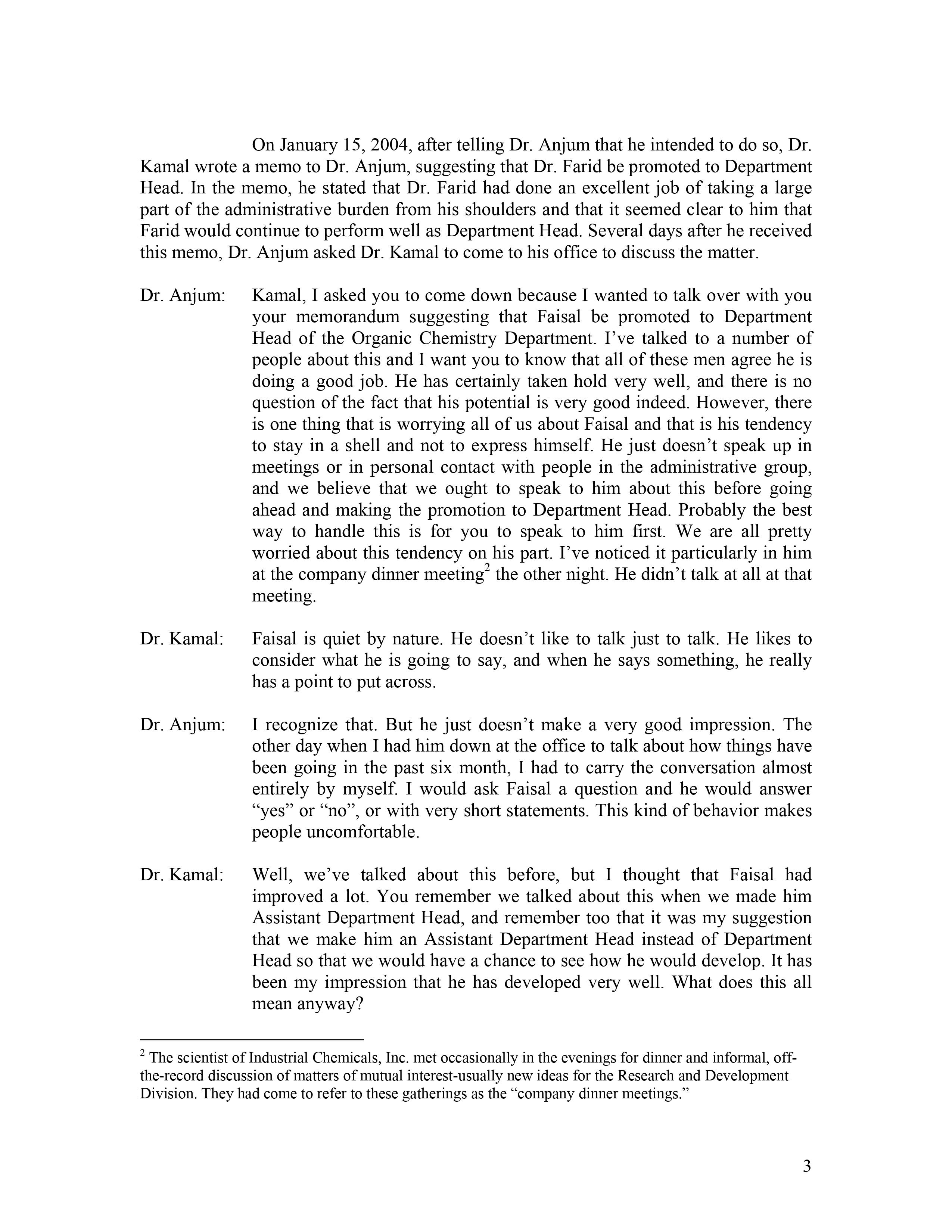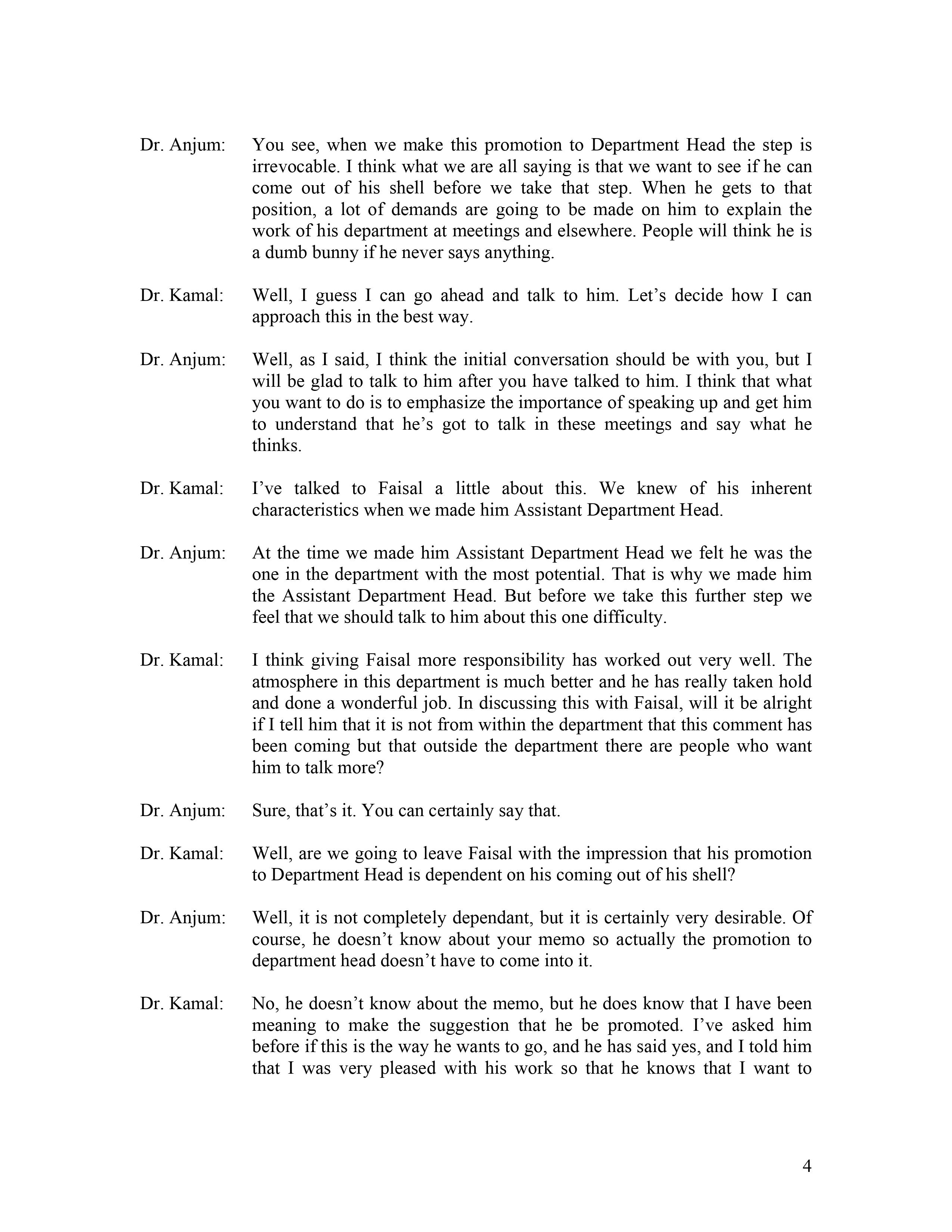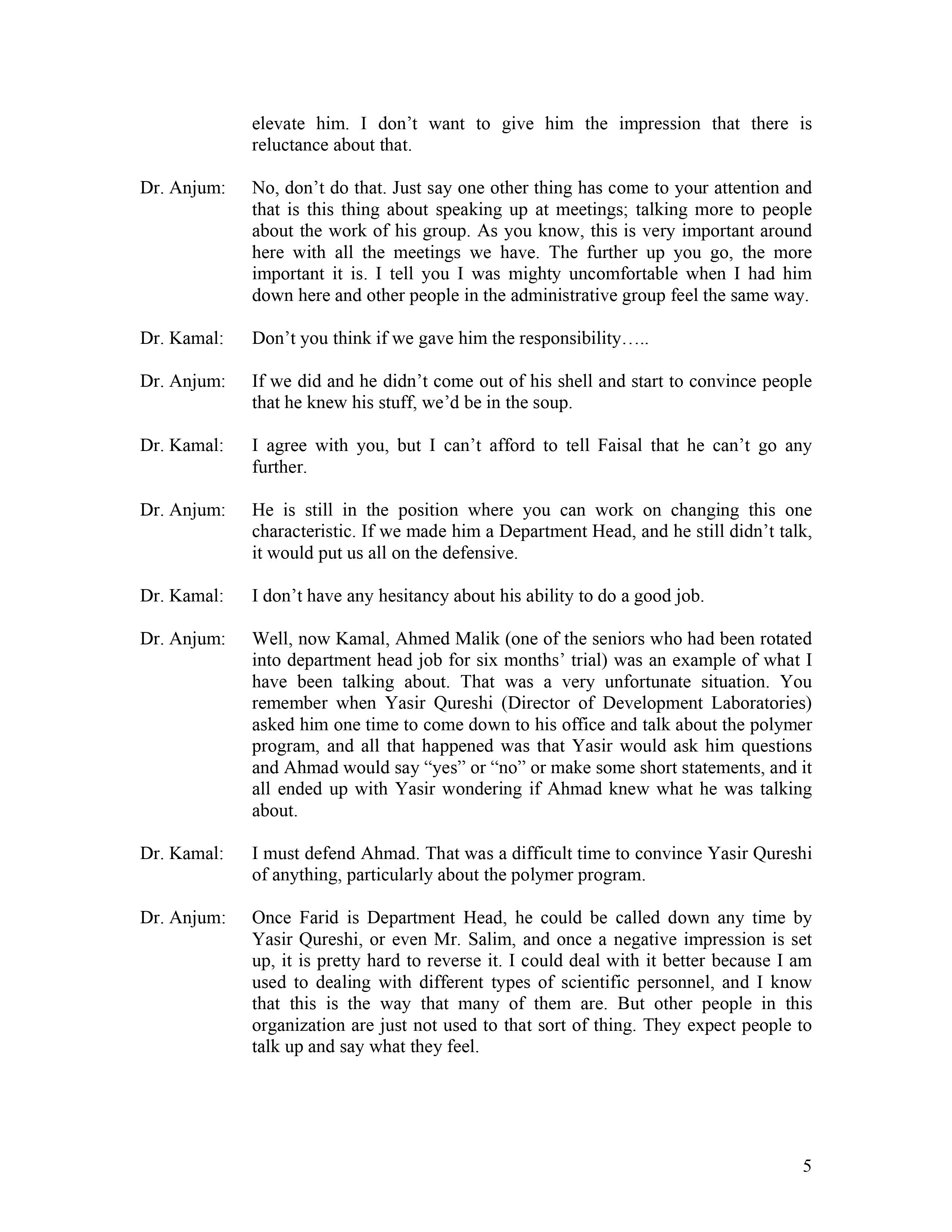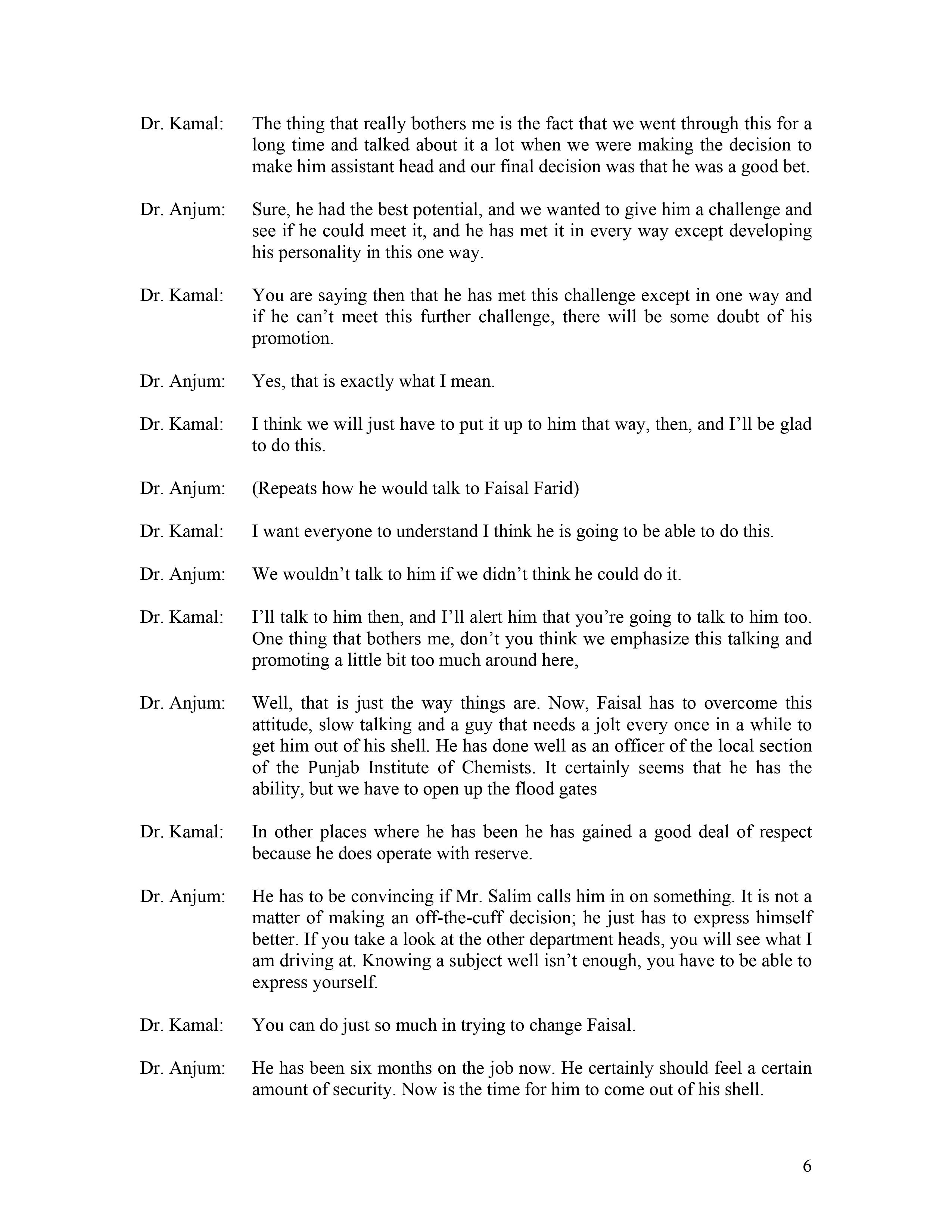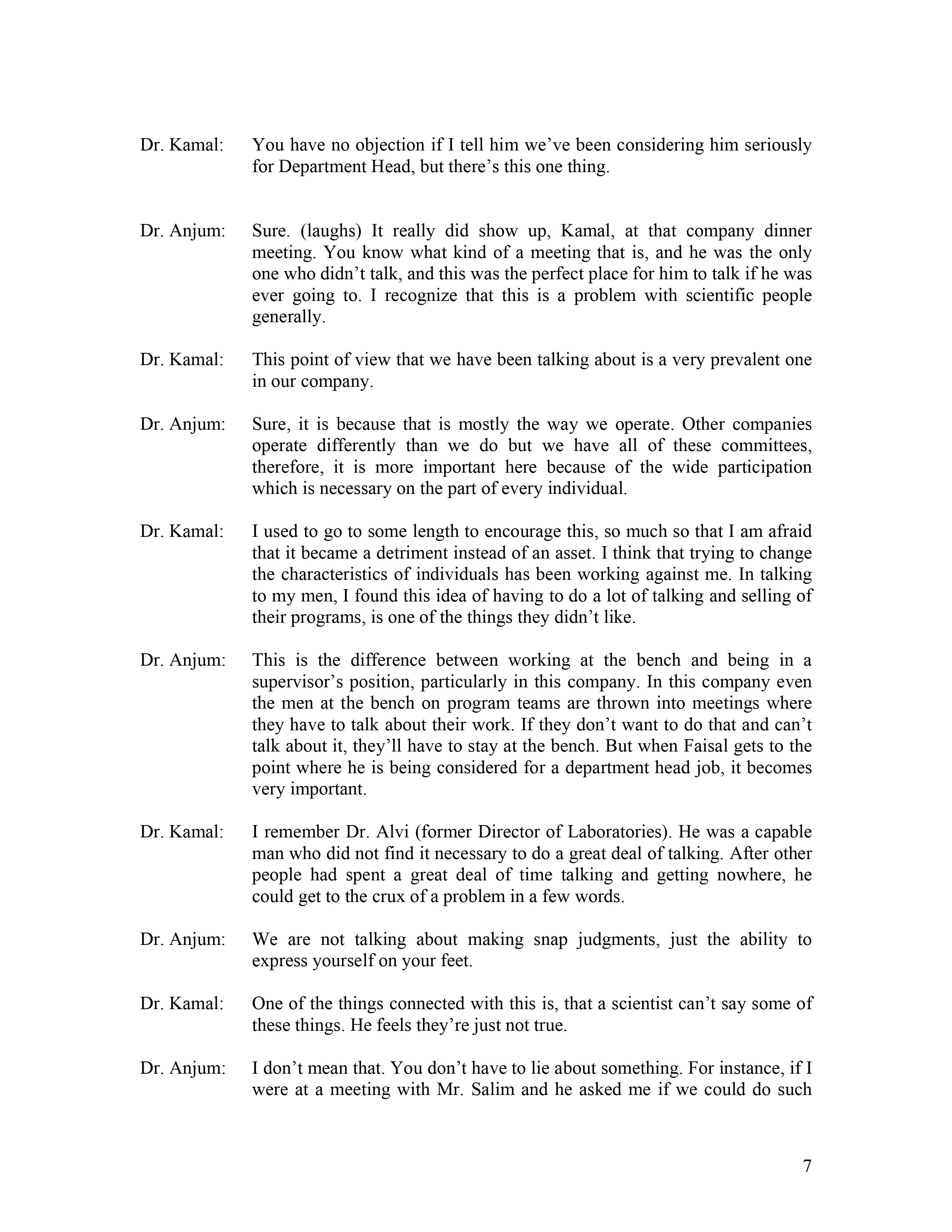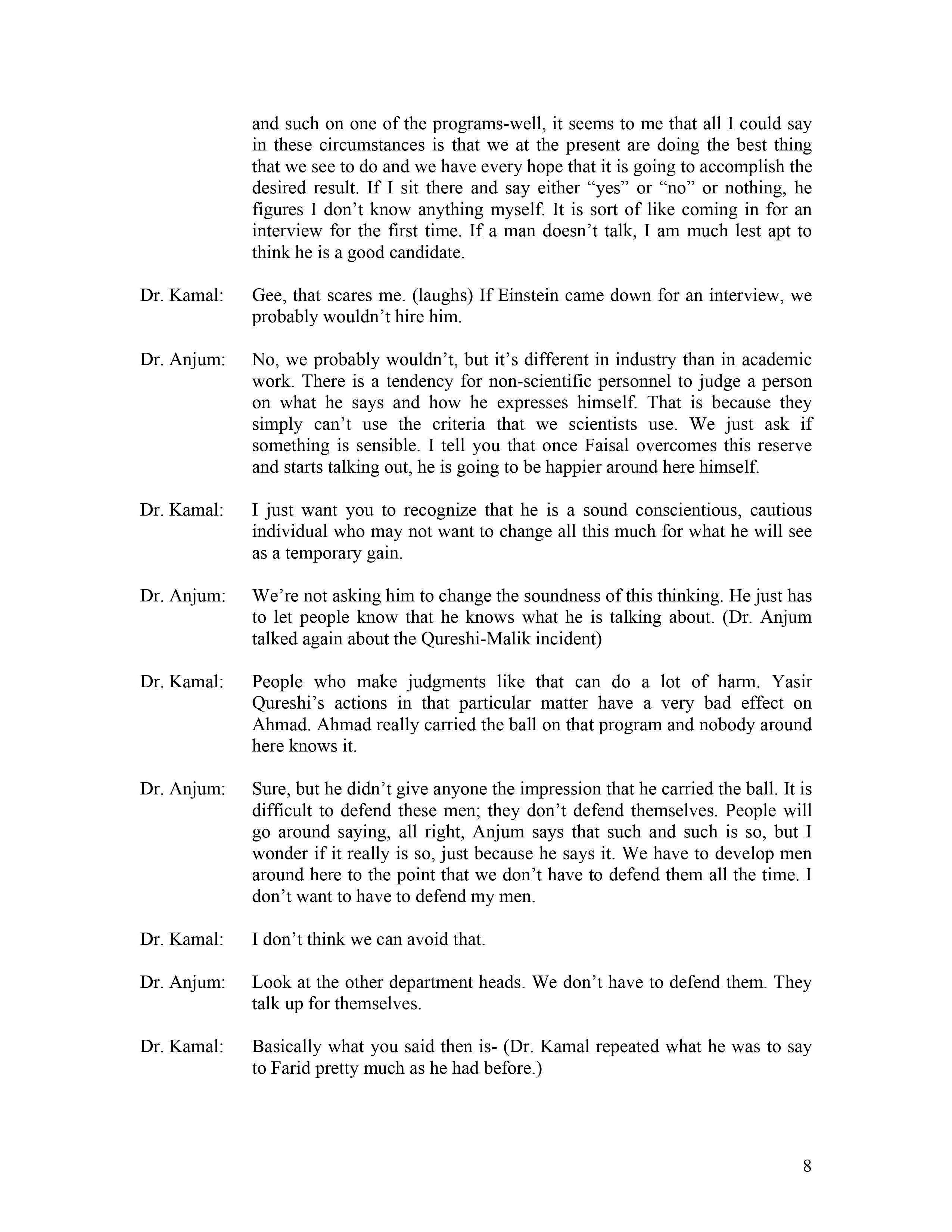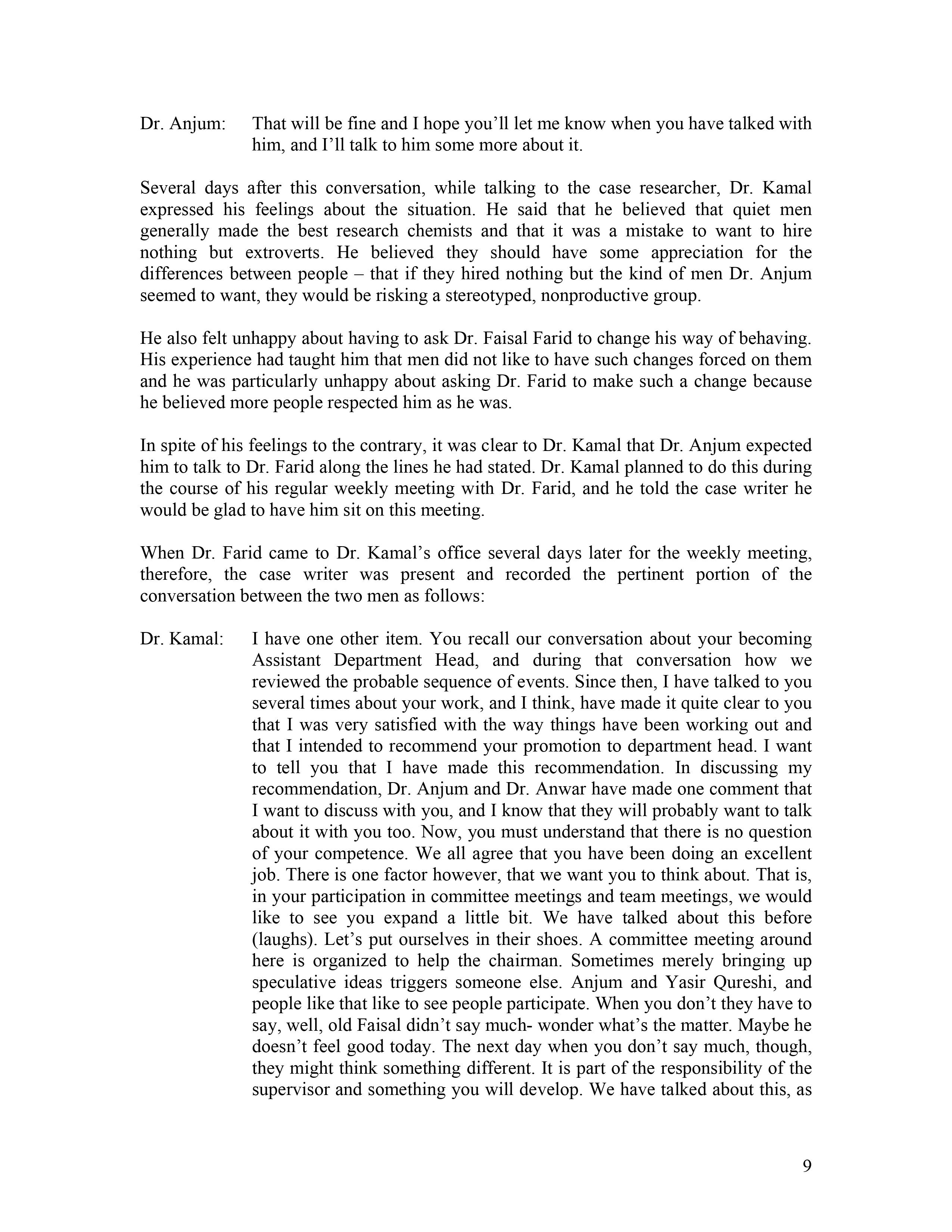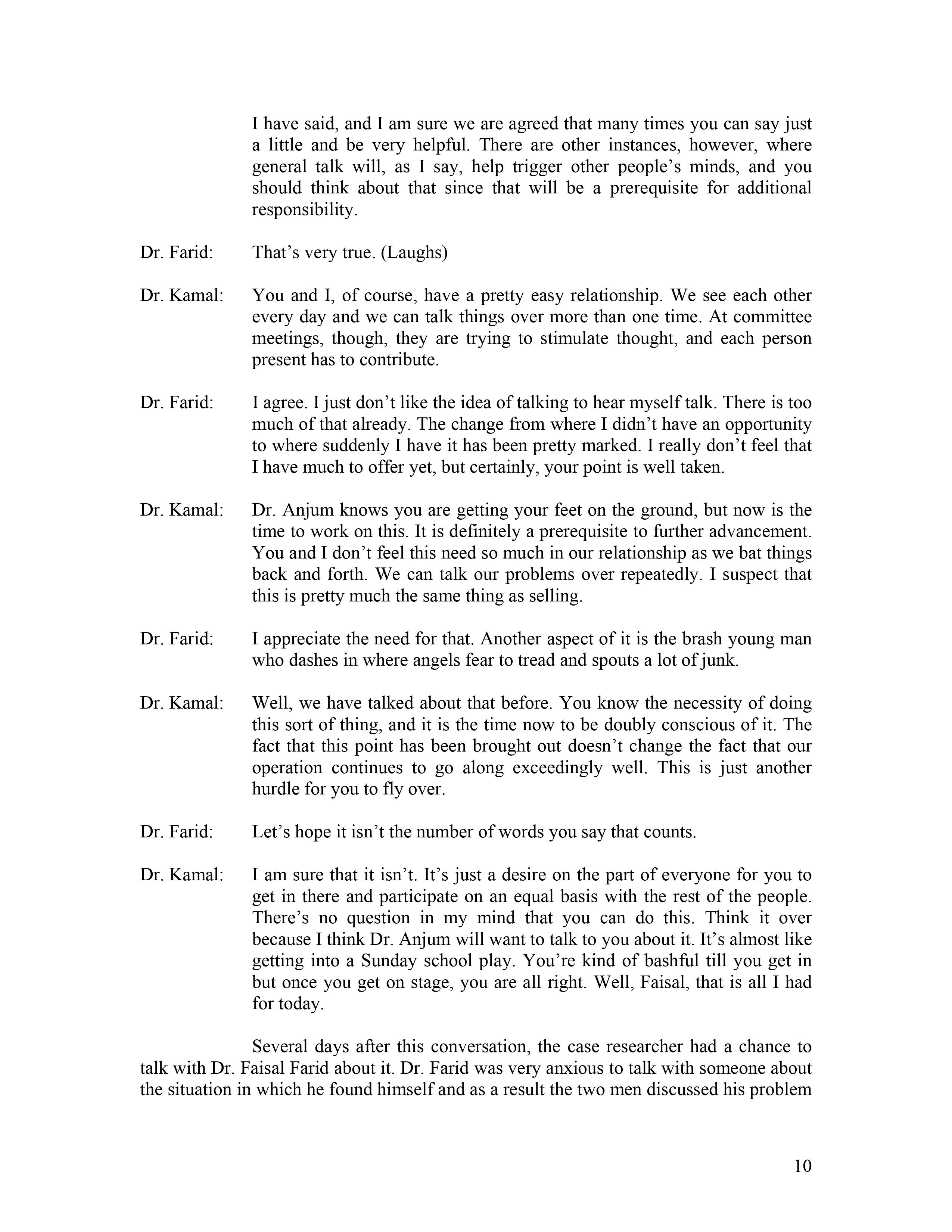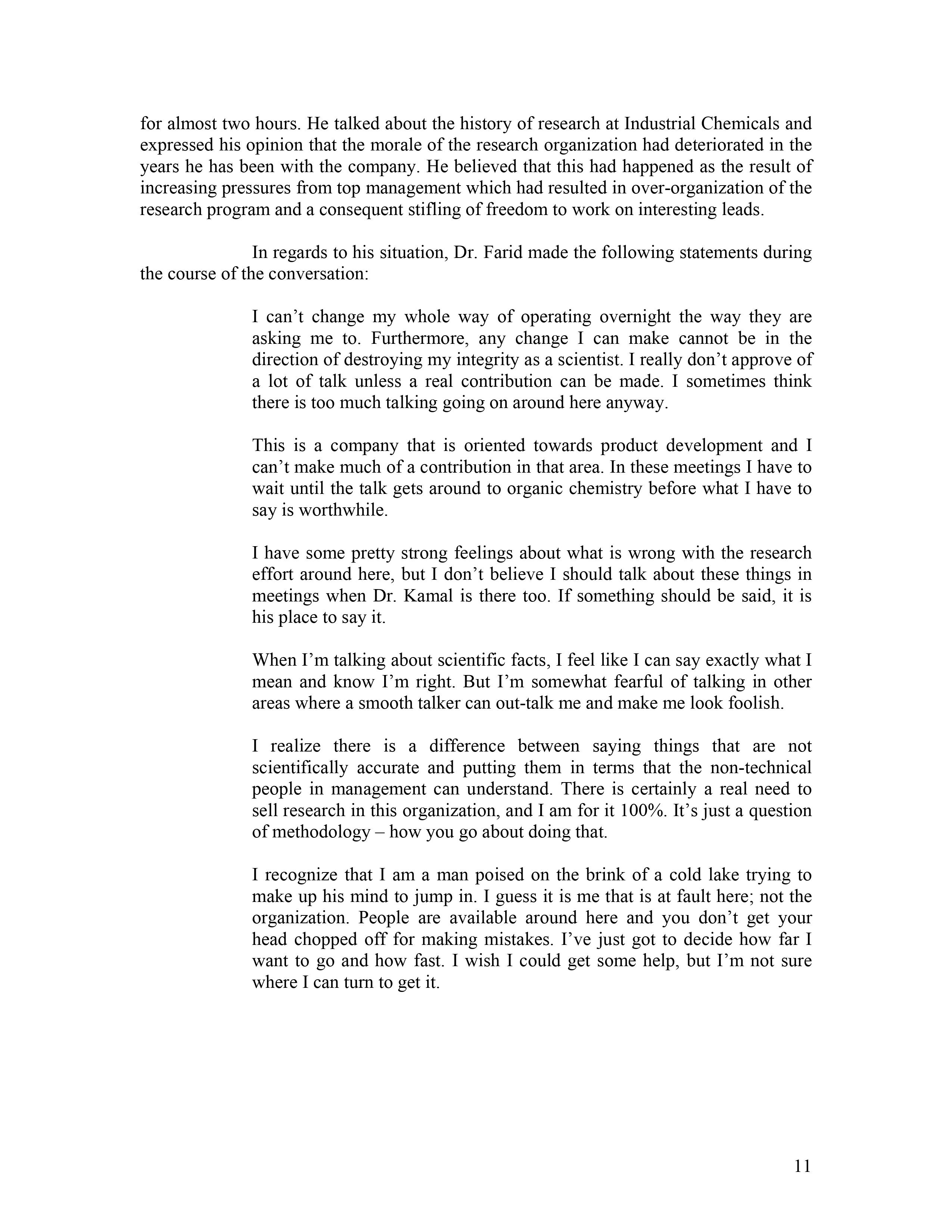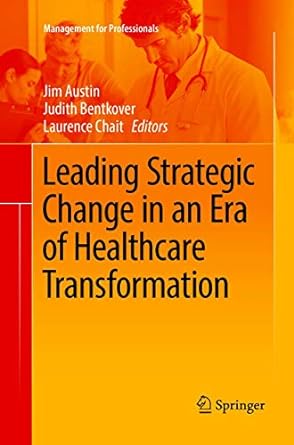Industrial Chemicals, Inc. In the Spring of 2002, the Director of Research and Development and the Business Manager of the Research and Development Division of Industrial Chemicals Incl, were faced with the task of nding a suitable man for the job of Department Head in the Organic Chemistry Department of their Research Laboratory. The former Department head, Dr. Kamal, had been promoted to the job of Director of Research Laboratories. He had continued, in addition to his new duties, to function as Department Head of organic chemistry, but this arrangement had not worked out well, and Dr. Kama] had pointed out that there was an evident need for a man of supervisory stature who could take a good deal of administrative burden from his shoulders. Selecting this man proved to be difcult. Dr. Kamal had selected as his senior scientists a number of brilliant young research chemists. Mr. Anwar, the Business Manager, and Dr. Anjum, the Director of Research and Development, agreed that he had selected men of decided academic leanings but had not been successful in his efforts to develop one of these men as a potential replacement for himself. Since the two men believed that any supervisor in the research organization of Industrial Chemicals must be an extrovert, able to sell research programs to the top management group, they found themselves unable to agree on a likely candidate for promotion from within the organic chemistry department. Industrial Chemicals, Inc. spent about 2 million dollars annually on research and development. There were two development laboratories in the Research and Development division and 5 smaller laboratories devoted to research. The research effort was supported by about a quarter of the total R & D budget. Mr. Salim, the president of the company was familiar with and close to the development activities of the laboratories. Through the years, he had contributed many worthwhile ideas that led to the development of successful products. The president's attitude towards the research effort, Mr. Anwar believed, was partially influenced by the fact that, in the late 1980's he had synthesized a new compound which eventually accounted for more than third of the company's total sales. It was largely the prots earned by this product which had nanced the greatly expanded research effort of Industrial Chemicals. But one result of this, according to Mr. Anwar, was that Mr. Salim now felt that the research organization was not keeping pace with the competition in the race to discover new highvolume products. His recurring question, when advised that the Director of Research Laboratories was recommending a new eld for research would be, \"Will this area give us a saleable group of products?\" When Dr. Kamal had to say that he could not promise this, Mr. Salim would reply, \"Then why do you want to spend money in that area?\" 1 All names have been disguised Although, Mr. Salim, in the Spring of 2002, was no longer attending Research Committee meetings, he had, in the last analysis, the nal word of approval on the research budget. Therefore, in an effort to keep informed regarding the research programs, he formed the habit of calling into his ofce Dr. Anjum, or any other man in a supervisory position in the research organization, whenever he wanted information of a research program. It was for this reason that, Dr. Anjum and Mr. Anwar were anxious to have as department head of organic chemistry who could perform well if called in by Mr. Salim to explain the work being done in his department. Having decided that none of the men in the organic chemistry department could perform effectively as department head, Dr. Anjum and Mr. Anwar came to the conclusion that someone would have to be brought in om outside the company. This conclusion was inuenced by two factors: rst they knew that Dr. Kamal had recently experimented with rotating three of the more likely seniors into the department head job on a six month's trial basis. None of them had shown that they could relieve Dr. Kamal of administrative tasks, and without exception they seemed unable to speak effectively about their work when called in by research executives. Second, their experience had been that Mr. Salim was far more inclined to listen respectfully to outside consultants or university professors than to the researchers in Industrial Chemicals. Between June of 2002 and March of the following year, the two executives considered the qualications of a number of possible candidates for the job. They actually offered the position to two eminent chemists, both university professors whose names had been suggested to them by Dr. Kamal, but both men turned the opportunity down, saying they would rather stay in academic life. When the second man made known his negative decision, it appeared that the only alternative lay in a reconsideration of their decision to promote one of the seniors in the department. Together with Dr. Kamal, they reviewed again the qualities of the men in the section and decided that Faisal Farid, a Ph. D. who had been with the organization for ten years, seemed to have the highest potential. Farid seemed to be respected by the other seniors, had an excellent mind and Dr. Kamal believed he could work into the job very well. In fact, Dr. Kamal found it difcult to understand why his superiors were so anxious to have an \"extrovert\" in the job. As he saw it, a department head should rst of all be a good scientist, whose scientic opinions and ideas were respected by his colleagues. Secondly, he should have the ability to handle administrative details and good judgment in editing reports, papers and memoranda written by his subordinates. Finally, he should know the company well so as to be able to provide the services for his men they needed to do their work. In his estimation, Faisal Farid had or could develop all of these qualities and he saw no reason for asking him to be a salesman as well. Condent that Dr. Farid would measure up to his new responsibilities, Dr. Kamal suggested that he originally be made Assistant Department Head and be promoted to Department Head if, at the end of six months' trial, he had demonstrated the required qualities. The other two men agreed to this plan and Dr. Faisal Farid was promoted to Assistant Department Head of the Organic Chemistry Department on June 1, 2003. On January 15, 2004, after telling Dr. Anjum that he intended to do 50, Dr. Kamal wrote a memo to Dr. Anjum, suggesting that Dr. Farid be promoted to Department Head. In the memo, he stated that Dr. Farid had done an excellent job of taking a large part of the administrative burden from his shoulders and that it seemed clear to him that Farid would continue to perform well as Department Head. Several days after he received this memo, Dr. Anjum asked Dr. Kamal to come to his ofce to discuss the matter. Dr. Anjum: Dr. Kamal: Dr. Anjum: Dr. Kamal: Kamal, I asked you to come down because I wanted to talk over with you your memorandum suggesting that Faisal be promoted to Department Head of the Organic Chemistry Department. I've talked to a number of people about this and I want you to know that all of these men agree he is doing a good job. He has certainly taken hold very well, and there is no question of the fact that his potential is very good indeed. However, there is one thing that is worrying all of us about Faisal and that is his tendency to stay in a shell and not to express himself. He just doesn't speak up in meetings or in personal contact with people in the administrative group, and we believe that we ought to speak to him about this before going ahead and making the promotion to Department Head. Probably the best way to handle this is for you to speak to him rst. We are all pretty worried about this tendency on his part. I've noticed it particularly in him at the company dinner meeting2 the other night. He didn't talk at all at that meeting. Faisal is quiet by nature. He doesn't like to talk just to talk. He likes to consider what he is going to say, and when he says something, he really has a point to put across. I recognize that. But he just doesn't make a very good impression. The other day when I had him down at the ofce to talk about how things have been going in the past six month, I had to carry the conversation almost entirely by myself. I would ask Faisal a question and he would answer \"yes\" or \"no\Dr. Anjum: Dr. Kamal: Dr. Anjum: Dr. Kamal: Dr. Anjum: Dr. Kama]: Dr. Anjum: Dr. Kamal: Dr. Anjum: Dr. Kamal: You see, when we make this promotion to Department Head the step is irrevocable. I think what we are all saying is that we want to see if he can come out of his shell before we take that step. When he gets to that position, a lot of demands are going to be made on him to explain the work of his department at meetings and elsewhere. People will think he is a dumb bunny if he never says anything. Well, I guess I can go ahead and talk to him. Let's decide how I can approach this in the best way. Well, as I said, I think the initial conversation should be with you, but I will be glad to talk to him after you have talked to him. I think that what you want to do is to emphasize the importance of speaking up and get him to understand that he's got to talk in these meetings and say what he thinks. I've talked to Faisal a little about this. We knew of his inherent characteristics when we made him Assistant Department Head. At the time we made him Assistant Department Head we felt he was the one in the department with the most potential. That is why we made him the Assistant Department Head. But before we take this further step we feel that we should talk to him about this one difculty. I think giving Faisal more responsibility has worked out very well. The atmosphere in this department is much better and he has really taken hold and done a wonderful job. In discussing this with Faisal, will it be alright if I tell him that it is not om within the department that this comment has been coming but that outside the department there are people who want him to talk more? Sure, that's it. You can certainly say that. Well, are we going to leave Faisal with the impression that his promotion to Department Head is dependent on his coming out of his shell? Well, it is not completely dependant, but it is certainly very desirable. Of course, he doesn't know about your memo so actually the promotion to department head doesn't have to come into it. No, he doesn't know about the memo, but he does know that I have been meaning to make the suggestion that he be promoted. I've asked him before if this is the way he wants to go, and he has said yes, and I told him that I was very pleased with his work so that he knows that I want to Dr. Anjum: Dr. Kamal: Dr. Anjum: Dr. Kamal: Dr. Anjum: Dr. Kamal: Dr. Anjum: Dr. Kamal: Dr. Anjum: elevate him. I don't want to give him the impression that there is reluctance about that. No, don't do that. Just say one other thing has come to your attention and that is this thing about speaking up at meetings; talking more to people about the work of his group. As you know, this is very important around here with all the meetings we have. The further up you go, the more important it is. I tell you I was mighty uncomfortable when I had him down here and other people in the administrative group feel the same way. Don't you think if we gave him the responsibility. . If we did and he didn't come out of his shell and start to convince people that he knew his stuff, we'd be in the soup. I agree with you, but I can't afford to tell Faisal that he can't go any further. He is still in the position where you can work on changing this one characteristic. If we made him a Department Head, and he still didn't talk, it would put us all on the defensive. I don't have any hesitancy about his ability to do a good job. Well, now Kama], Ahmed Malik (one of the seniors who had been rotated into department head job for six months' trial) was an example of what I have been talking about. That was a very unfortunate situation. You remember when Yasir Qureshi (Director of Development Laboratories) asked him one time to come down to his ofce and talk about the polymer program, and all that happened was that Yasir would ask him questions and Ahmad would say \"yes\" or \"no\" or make some short statements, and it all ended up with Yasir wondering if Ahmad knew what he was talking about. I must defend Ahmad. That was a difcult time to convince Yasir Qureshi of anything, particularly about the polymer program. Once Farid is Department Head, he could be called down any time by Yasir Qureshi, or even Mr. Salim, and once a negative impression is set up, it is pretty hard to reverse it. I could deal with it better because I am used to dealing with different types of scientic personnel, and I know that this is the way that many of them are. But other people in this organization are just not used to that sort of thing. They expect people to talk up and say what they feel. Dr. Kamal: Dr. Anjum: Dr. Kamal: Dr. Anjum: Dr. Kamal: Dr. Anjum: Dr. Kamal: Dr. Anjum: Dr. Kamal: Dr. Anjum: Dr. Kamal: Dr. Anjum: Dr. Kamal: Dr. Anjum: The thing that really bothers me is the fact that we went through this for a long time and talked about it a lot when we were making the decision to make him assistant head and our nal decision was that he was a good bet. Sure, he had the best potential, and we wanted to give him a challenge and see if he could meet it, and he has met it in every way except developing his personality in this one way. You are saying then that he has met this challenge except in one way and if he can't meet this further challenge, there will be some doubt of his promotion. Yes, that is exactly what I mean. I think we will just have to put it up to him that way, then, and I'll be glad to do this. (Repeats how he would talk to Faisal F arid) I want everyone to understand I think he is going to be able to do this. We wouldn't talk to him if we didn't think he could do it. I'll talk to him then, and I'll alert him that you're going to talk to him too. One thing that bothers me, don't you think we emphasize this talking and promoting a little bit too much around here, Well, that is just the way things are. Now, Faisal has to overcome this attitude, slow talking and a guy that needs a jolt every once in a while to get him out of his shell. He has done well as an ofcer of the local section of the Punjab Institute of Chemists. It certainly seems that he has the ability, but we have to open up the ood gates In other places where he has been he has gained a good deal of respect because he does operate with reserve. He has to be convincing if Mr. Salim calls him in on something. It is not a matter of making an off-the-cuff decision; he just has to express himself better. If you take a look at the other department heads, you will see what I am driving at. Knowing a subject well isn't enough, you have to be able to express yourself. You can do just so much in trying to change Faisal. He has been six months on the job now. He certainly should feel a certain amount of security. Now is the time for him to come out of his shell. Dr. Kamal: Dr. Anjum: Dr. Kamal: Dr. Anjum: Dr. Kamal: Dr. Anjum: Dr. Kamal: Dr. Anjum: Dr. Kamal: Dr. Anjum: You have no objection if I tell him we've been considering him seriously for Department Head, but there's this one thing. Sure. (laughs) It really did show up, Kama], at that company dinner meeting. You know what kind of a meeting that is, and he was the only one who didn't talk, and this was the perfect place for him to talk if he was ever going to. I recognize that this is a problem with scientic people generally. This point of view that we have been talking about is a very prevalent one in our company. Sure, it is because that is mostly the way we operate. Other companies operate differently than we do but we have all of these committees, therefore, it is more important here because of the wide participation which is necessary on the part of every individual. I used to go to some length to encourage this, so much so that I am aaid that it became a detriment instead of an asset. I think that trying to change the characteristics of individuals has been working against me. In talking to my men, I found this idea of having to do a lot of talking and selling of their programs, is one of the things they didn't like. This is the difference between working at the bench and being in a supervisor's position, particularly in this company. In this company even the men at the bench on program teams are thrown into meetings where they have to talk about their work. If they don't want to do that and can't talk about it, they'll have to stay at the bench. But when Faisal gets to the point where he is being considered for a department head job, it becomes very important. I remember Dr. Alvi (former Director of Laboratories). He was a capable man who did not nd it necessary to do a great deal of talking. After other people had spent a great deal of time talking and getting nowhere, he could get to the crux of a problem in a few words. We are not talking about making snap judgments, just the ability to express yourself on your feet. One of the things connected with this is, that a scientist can't say some of these things. He feels they're just not true. I don't mean that. You don't have to lie about something. For instance, if I were at a meeting with Mr. Salim and he asked me if we could do such Dr. Kamal: Dr. Anjum: Dr. Kamal: Dr. Anjum: Dr. Kamal: Dr. Anjum: Dr. Kamal: Dr. Anjum: Dr. Kamal: and such on one of the programs-well, it seems to me that all I could say in these circumstances is that we at the present are doing the best thing that we see to do and we have every hope that it is going to accomplish the desired result. If I sit there and say either \"yes\" or \"no\" or nothing, he gures I don't know anything myself It is sort of like coming in for an interview for the rst time. If a man doesn't talk, I am much lest apt to think he is a good candidate. Gee, that scares me. (laughs) If Einstein came down for an interview, we probably wouldn't hire him. No, we probably wouldn't, but it's different in industry than in academic work. There is a tendency for non-scientic personnel to judge a person on what he says and how he expresses himself. That is because they simply can't use the criteria that we scientists use. We just ask if something is sensible. I tell you that once Faisal overcomes this reserve and starts talking out, he is going to be happier around here himself. I just want you to recognize that he is a sound conscientious, cautious individual who may not want to change all this much for what he will see as a temporary gain. We're not asking him to change the soundness of this thinking. He just has to let people know that he knows what he is talking about. (Dr. Anjum talked again about the QureshiMalik incident) People who make judgments like that can do a lot of harm. Yasir Qureshi's actions in that particular matter have a very bad effect on Ahmad. Ahmad really carried the ball on that program and nobody around here knows it. Sure, but he didn't give anyone the impression that he carried the ball. It is difcult to defend these men; they don't defend themselves. People will go around saying, all right, Anjum says that such and such is so, but I wonder if it really is so, just because he says it. We have to develop men around here to the point that we don't have to defend them all the time. I don't want to have to defend my men. I don't think we can avoid that. Look at the other department heads. We don't have to defend them. They talk up for themselves. Basically what you said then is- (Dr. Karnal repeated what he was to say to Farid pretty much as he had before.) Dr. Anjum: That will be ne and I hope you'll let me know when you have talked with him, and I'll talk to him some more about it. Several days after this conversation, while talking to the case researcher, Dr. Kamal expressed his feelings about the situation. He said that he believed that quiet men generally made the best research chemists and that it was a mistake to want to hire nothing but extroverts. He believed they should have some appreciation for the differences between people that if they hired nothing but the kind of men Dr. Anjum seemed to want, they would be risking a stereotyped, nonproductive group. He also felt unhappy about having to ask Dr. Faisal Farid to change his way of behaving. His experience had taught him that men did not like to have such changes forced on them and he was particularly unhappy about asking Dr. Farid to make such a change because he believed more people respected him as he was. In spite of his feelings to the contrary, it was clear to Dr. Kamal that Dr. Anjum expected him to talk to Dr. Farid along the lines he had stated. Dr. Kamal planned to do this during the course of his regular weekly meeting with Dr. F arid, and he told the case writer he would be glad to have him sit on this meeting. When Dr. F arid came to Dr. Kamal's ofce several days later for the weekly meeting, therefore, the case writer was present and recorded the pertinent portion of the conversation between the two men as follows: Dr. Kamal: I have one other item. You recall our conversation about your becoming Assistant Department Head, and during that conversation how we reviewed the probable sequence of events. Since then, I have talked to you several times about your work, and I think, have made it quite clear to you that I was very satised with the way things have been working out and that I intended to recommend your promotion to department head. I want to tell you that I have made this recommendation. In discussing my recommendation, Dr. Anjum and Dr. Anwar have made one comment that I want to discuss with you, and I know that they will probably want to talk about it with you too. Now, you must understand that there is no question of your competence. We all agree that you have been doing an excellent job. There is one factor however, that we want you to think about. That is, in your participation in committee meetings and team meetings, we would like to see you expand a little bit. We have talked about this before (laughs). Let's put ourselves in their shoes. A committee meeting around here is organized to help the chairman. Sometimes merely bringing up speculative ideas triggers someone else. Anjum and Yasir Qureshi, and people like that like to see people participate. When you don't they have to say, well, old Faisal didn't say much wonder what's the matter. Maybe he doesn't feel good today. The next day when you don't say much, though, they might think something different. It is part of the responsibility of the supervisor and something you will develop. We have talked about this, as Dr. Dr. Dr. Dr. Dr. Dr. Dr. Dr. Farid: Kamal: Farid: Kamal: Farid: Kamal: Farid: Kama]: I have said, and I am sure we are agreed that many times you can say just a little and be very helpful. There are other instances, however, where general talk will, as I say, help trigger other people's minds, and you should think about that since that will be a prerequisite for additional responsibility. That's very true. (Laughs) You and I, of course, have a pretty easy relationship. We see each other every day and we can talk things over more than one time. At committee meetings, though, they are trying to stimulate thought, and each person present has to contribute. I agree. I just don't like the idea of talking to hear myself talk. There is too much of that already. The change from where I didn't have an opportunity to where suddenly I have it has been pretty marked. I really don't feel that I have much to offer yet, but certainly, your point is well taken. Dr. Anjum knows you are getting your feet on the ground, but now is the time to work on this. It is denitely a prerequisite to further advancement. You and I don't feel this need so much in our relationship as we bat things back and forth. We can talk our problems over repeatedly. I suspect that this is pretty much the same thing as selling. I appreciate the need for that. Another aspect of it is the brash young man who dashes in where angels fear to tread and spouts a lot of junk. Well, we have talked about that before. You know the necessity of doing this sort of thing, and it is the time now to be doubly conscious of it. The fact that this point has been brought out doesn't change the fact that our operation continues to go along exceedingly well. This is just another hurdle for you to y over. Let's hope it isn't the number of words you say that counts. I am sure that it isn't. It's just a desire on the part of everyone for you to get in there and participate on an equal basis with the rest of the people. There's no question in my mind that you can do this. Think it over because I think Dr. Anjum will want to talk to you about it. It's almost like getting into a Sunday school play. You're kind of bashful till you get in but once you get on stage, you are all right. Well, Faisal, that is all I had for today. Several days after this conversation, the case researcher had a chance to talk with Dr. Faisal Farid about it. Dr. Farid was very anxious to talk with someone about the situation in which he found himself and as a result the two men discussed his problem 10 for almost two hours. He talked about the history of research at Industrial Chemicals and expressed his opinion that the morale of the research organization had deteriorated in the years he has been with the company. He believed that this had happened as the result of increasing pressures from top management which had resulted in overorganization of the research program and a consequent stifling of freedom to work on interesting leads. In regards to his situation, Dr. Farid made the following statements during the course of the conversation: I can't change my whole way of operating overnight the way they are asking me to. Furthermore, any change I can make cannot be in the direction of destroying my integrity as a scientist. I really don't approve of a lot of talk unless a real contribution can be made. I sometimes think there is too much talking going on around here anyway. This is a company that is oriented towards product development and I can't make much of a contribution in that area. In these meetings I have to wait until the talk gets around to organic chemistry before what I have to say is worthwhile. I have some pretty strong feelings about what is wrong with the research effort around here, but I don't believe I should talk about these things in meetings when Dr. Kamal is there too. If something should be said, it is his place to say it. When I'm talking about scientific facts, I feel like I can say exactly what I mean and know I'm right. But I'm somewhat fearful of talking in other areas where a smooth talker can out-talk me and make me look foolish. I realize there is a difference between saying things that are not scientifically accurate and putting them in terms that the non-technical people in management can understand. There is certainly a real need to sell research in this organization, and I am for it 100%. It's just a question of methodology how you go about doing that. I recognize that I am a man poised on the brink of a cold lake trying to make up his mind to jump in. I guess it is me that is at fault here; not the organization. People are available around here and you don't get your head chopped off for making mistakes. I've just got to decide how far I want to go and how fast. I wish I could get some help, but I'm not sure where I can turn to get it. 11
